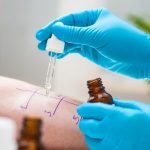New Screening Blood Test for Prostate Cancer
Node Smith, ND
A new blood test that predicts the overall risk for prostate cancer was presented at the 13th Annual Meeting of the American Urological Association (AUA) on May 18, 2018 in San Francisco.1 The new test, IsoPSA, has been undergoing multi-center validation studies, which have shown it to be more accurate in predicting overall risk of prostate cancer than the standard prostate-specific antigen (PSA) test.
IsoPSA test
During both preliminary studies and the validation study, it was noted that over 40 percent of biopsies were unnecessary and could have been avoided. This suggests that using the IsoPSA may dramatically lower the need for biopsy. This could decrease overdetection and overtreatment of nonlethal prostate cancer.
Test developed to distinguish between high and low grade prostate cancer
The test itself, IsoPSA, has been developed to distinguish between high and low-grade prostate cancer. High grade disease is defined as a Gleason score over or equal to 7.
The multicenter validation studies have been evaluating the performance of the test with a new cohort of participants, as well as defining cutoff parameters. The validation of the test has used detection of cancer by biopsy as a definitive comparison.
“To be clinically useful, a biomarker must be both tissue-specific and cancer-specific”
“To be clinically useful, a biomarker must be both tissue-specific and cancer-specific. While PSA is prostate-specific, it is not specific for prostate cancer, leading to diagnostic inaccuracy and too many unneeded biopsies,” said Dr. Klein, chair of Cleveland Clinic’s Glickman Urological & Kidney Institute. “IsoPSA fulfills both the tissue- and cancer-specificity needed for a useful biomarker, and this validation study shows that it can more accurately detect high-grade cancer and reduce the rate of unneeded biopsies in patients at low risk of this disease.”
Source:
- Alshalalfa M, Karnes RJ, Sharma V, et al. Development and validation of a prostate cancer genomic signature that predicts early ADT treatment response following radical prostatectomy. Clin Cancer Res. 2018.
Image Copyright: <a href=’https://www.123rf.com/profile_gamjai’>gamjai / 123RF Stock Photo</a>
 Node Smith, ND, is a naturopathic physician in Portland, OR and associate editor for NDNR. He has been instrumental in maintaining a firm connection to the philosophy and heritage of naturopathic medicine among the next generation of docs. He helped found the first multi-generational experiential retreat, which brings elders, alumni, and students together for a weekend camp-out where naturopathic medicine and medical philosophy are experienced in nature. Four years ago he helped found the non-profit, Association for Naturopathic ReVitalization (ANR), for which he serves as the board chairman. ANR has a mission to inspire health practitioners to embody the naturopathic principles through experiential education. Node also has a firm belief that the next era of naturopathic medicine will see a resurgence of in-patient facilities which use fasting, earthing, hydrotherapy and homeopathy to bring people back from chronic diseases of modern living; he is involved in numerous conversations and projects to bring about this vision.
Node Smith, ND, is a naturopathic physician in Portland, OR and associate editor for NDNR. He has been instrumental in maintaining a firm connection to the philosophy and heritage of naturopathic medicine among the next generation of docs. He helped found the first multi-generational experiential retreat, which brings elders, alumni, and students together for a weekend camp-out where naturopathic medicine and medical philosophy are experienced in nature. Four years ago he helped found the non-profit, Association for Naturopathic ReVitalization (ANR), for which he serves as the board chairman. ANR has a mission to inspire health practitioners to embody the naturopathic principles through experiential education. Node also has a firm belief that the next era of naturopathic medicine will see a resurgence of in-patient facilities which use fasting, earthing, hydrotherapy and homeopathy to bring people back from chronic diseases of modern living; he is involved in numerous conversations and projects to bring about this vision.









